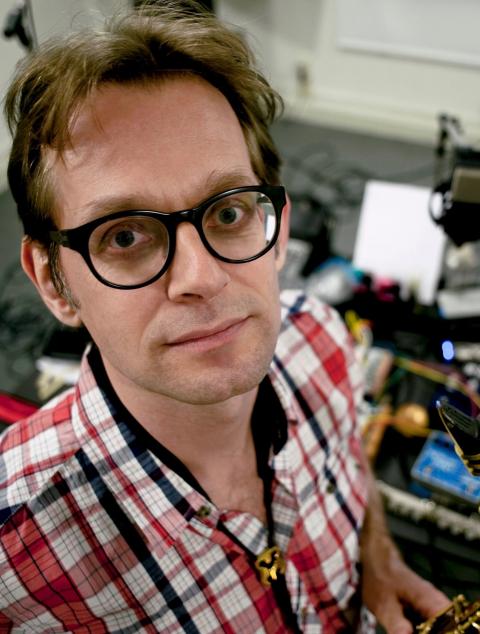Don't see what you're looking for?
Main Site
Berklee.eduCampuses and Schools

Francesca Patella
Jorrit Dijkstra
For media inquiries, please contact Media Relations
The music of saxophonist and composer Jorrit Dijkstra draws from the jazz tradition in spirit and sound, but has crossed stylistic and cultural borders in order to express a strong, evolving personal vision. Originally from Eindhoven, the Netherlands, he spent his formative years in Amsterdam’s vibrant improvisation community, playing jazz, free improvisation, and world music. Since moving to the United States in 2002, Dijkstra has deepened his affinity with the experimental forces of American music while staying in touch with his Dutch musical roots. His recent projects include his quintet, Cutout; quartet, BOLT; the Porch Trio; the large ensemble Bathysphere in Boston; and his Music for Reeds and Electronics, a solo project with electronics, among others. In 2009, he received the composition commission from the North Sea Jazz Festival for his nonet Pillow Circles.
Dijkstra uses the Lyricon (a vintage electronic wind instrument from the 1970s) to extend his musical palette into an idiosyncratic mix of cool jazz, free improvisation, and electronic minimalism. As a composer, he has received commissions from the David Kweksilber Big Band, the Tetzepi Big Band, the Amstel Saxophone Quartet, the Harvard Jazz Band, and saxophonist Ties Mellema. Dijkstra has released over 20 CDs as a leader and participated in projects ranging from Anthony Braxton’s Ghost Trance and Guus Janssen’s opera Noach to a rare live performance with Texas outsider musician Jandek. He is the cofounder of the independent record label Driff Records, an associate professor at Berklee College of Music, and a faculty member at New England Conservatory.
- Saxophonist and composer
- Leader of Cutout, the Porch Trio, Duo Buzz (with dancer Jessica Roseman), Trio Linger (with John Hollenbeck and Benoit Delbecq), and Pillow Circles, among others
- Appearances with Anthony Braxton, Han Bennink, Jeb Bishop, Jim Black, and Willem Breuker, among many others
- Over 20 CDs as a leader on Driff Records, Clean Feed, Songlines, Trytone, and BV Haast
- Composition commissions from the North Sea Jazz Festival, David Kweksilber Big Band, Amstel Saxophone Quartet, Harvard Jazz Band, and Tetzepi BigTet, among others
- Performances at the North Sea Jazz Festival, the Umbrella Festival, the Vancouver Jazz Festival, the Edinburgh Jazz Festival, and the Festival Controindicazioni, among others
- Taught master classes on improvisation worldwide, including in the U.S., Canada, Mexico, Brazil, and the Netherlands, among others
- Current faculty member at New England Conservatory
- Former faculty member at University of Massachusetts, Dartmouth and ArtEZ Academy of Music, Arnhem, the Netherlands
- Teaching and Performance Degree, Sweelinck Conservatory, Amsterdam, Netherlands
- M.M., New England Conservatory of Music, jazz composition
"The genius of the ear training curriculum is that it's incredibly well designed, while not biased towards a particular style of music. And the rigorousness of it is impressive as well, pulling in a general freshman population and bringing them up to a really high standard after four semesters. In my classes, I try to give my own twist to the curriculum and always make sure the students create music, rather than drill exercises."
"I went to a conservatory in Amsterdam in the 1980s. It was a small, alternative improvisation department, deliberately avoiding the name jazz so the students would explore their own music rather than just copy the American jazz masters. I was living in a great city, which was half of my education. I went to amazing concerts and jam sessions, and then I started forming my own bands and playing around, booking tours. Connecting with musicians from other countries was very important to me. I went to the Banff Jazz Workshop in Canada, then I got a Fulbright and went to New England Conservatory because I wanted to focus more on composing and classical music topics."
"I still have strong ties with the Netherlands, which has a really great environment for ensembles and composers. In addition to my musical life in the U.S., I'm very fortunate to receive composition commissions for contemporary music ensembles over there."
